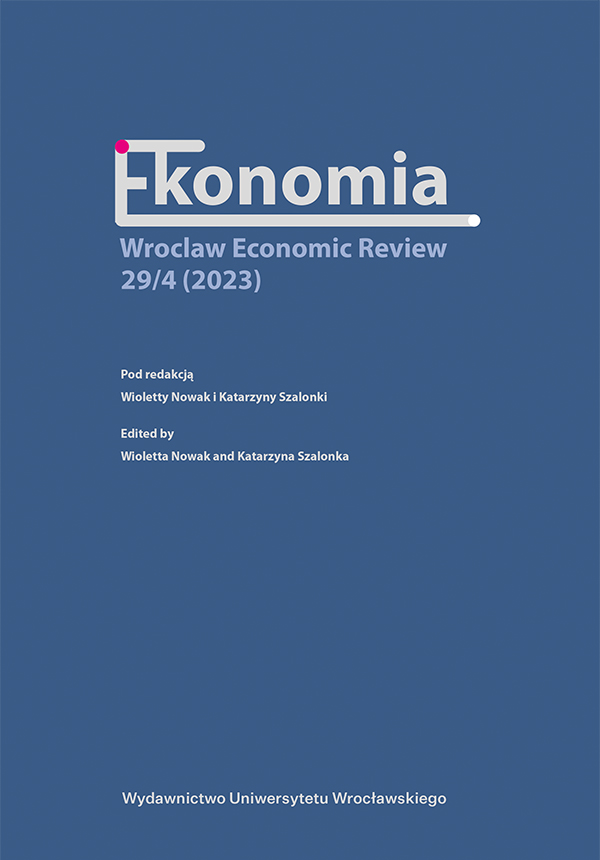

Articles

This article explores the extent to which various leisure activities adopted during the pandemic, due to the closure of service facilities and other restrictions, are still popular among individuals. It draws on both secondary research and primary data collected through a website survey technique among 1,100 adult Poles in November 2022. The findings indicate that Poles continue to enjoy streaming movies and music, and maintain social connections online even after the pandemic. Those who used physical activity tracking apps during the pandemic still rely on them. Due to travel restrictions and uncertainty of the pandemic period, respondents now plan and book trips within Poland on short notice.
Ariadna Nationwide Research Panel. (2023). Rules for Participation in the Ariadna Research Program. Retrieved November 20, 2023, from https://panelariadna.pl/regulamin.pdf?v=15122023.
Aurel, J.G., Paramita, S. (2021). FOMO and JOMO phenomenon of active millennial Instagram users at 2020 in Jakarta. In Proceedings of the International Conference on Economics, Business, Social, and Humanities (ICEBSH 2021). Advances in Social Science, Education and Humanities Research, vol. 570 (722–729). Amsterdam: Atlantis Press.
Bhatia, A., Roy, B., Kumar, A. (2022). A review of tourism sustainability in the era of COVID-19. Journal of Statistics and Management Systems, 25(8), 1871–1888. https://doi.org/10.1080/09720510.2021.1995196.
Bond, A.J., Widdop, P., Cockayne, D., Parnel, D. (2021). Prosumption, networks and value during a global pandemic: Lockdown leisure and COVID-19. Sciences: An Interdisciplinary Journal, 43(1–2), 70–77. https://doi.org/10.1080/01490400.2020.1773985.
Buczyńska, A. (2023, March 17). Polacy nie chcą być pasywni w weekendy. Coraz aktywniej spędzamy czas wolny. InfoWire.pl. Retrieved May 19, 2023, from https://www.infowire.pl/generic/release/796846/polacy-nie-chca-byc-pasywni-w-weekendy-coraz-aktywniej-spedzamy-czas-wolny.
Casselman, B., Koeze, E. (2021, July 27). The pandemic changed how we spent our time. The New York Times. Retrieved May 19, 2023, from https://www.nytimes.com/interactive/2021/07/27/business/economy/covid-parenting-work-time.html.
Dębska, M. (2022, October 10). Polacy w czasie wolnym wybierają aktywność. Wyniki badania. Retrieved May 24, 2023, from https://www.infowire.pl/generic/release/773413/polacy-w-czasie-wolnym-wybieraja-aktywnosc-wyniki-badania.
ESOMAR. (2016). ICC/ESOMAR International Code on Market, Opinion and Social Research and Data Analytics. Amsterdam: ESOMAR World Research.
Feliksiak, M. (2023). Aktywności i doświadczenia Polaków w 2022 roku. Komunikat z badań. Warszawa: Fundacja CBOS.
GUS. (2022). Społeczeństwo informacyjne w Polsce w 2022 r. Główny Urząd Statystyczny. Warszawa — Szczecin.
Hammami, A., Harrabi, B., Mohr, M., Krustrup, P. (2022). Physical activity and coronavirus disease 2019 (COVID-19): Specific recommendations for home-based physical training. Managing Sport and Leisure, 27(1–2), 26–31. https://doi.org/10.1080/23750472.2020.1757494.
Homer, S.T., Kanagasapapathy, G.D. (2023). Gen Z perceptions of sustainable tourism: A scale development study. Tourism Recreation Research. https://doi.org/10.1080/02508281.2023.2185734.
Hosseinzadeh, P., Zareipour, M., Baljani, E., Moradali, M.R. (2022). Social consequences of the COVID-19 pandemic. A systematic review. Investigacion y Educacion en Enfermeria. 40(1), e10. https://doi.org/10.17533/udea.iee.v40n1e10.
Kolny, B. (2021). Formy spędzania czasu wolnego w okresie pandemii z wykorzystaniem internetu. In W. Nowak, K. Szalonka (eds.), Zdrowie i style życia. Ekonomiczne, społeczne i zdrowotne skutki pandemii (371–384). Wrocław: E-Wydawnictwo. Prawnicza i Ekonomiczna Biblioteka Cyfrowa; Wydział Prawa, Administracji i Ekonomii Uniwersytet Wrocławski.
Lazcano, I., Doistua, J., Madariaga A. (2022). Effects of the COVID-19 pandemic on leisure among the youth of Spain. Sustainability, 14(7), 3993. https://doi.org/10.3390/su14073993.
Lesser, I.A., Nienhuis, C.P. (2020). The impact of COVID-19 on physical activity behavior and well-being of Canadians. International Journal of Environmental Research and Public Health, 17(11), 3899. https://doi.org/10.3390/ijerph17113899.
Local Government Association. (2020, November 10). Leisure Under Lockdown: How Culture and Leisure Services Responded to COVID-19 — Full Report. Retrieved May 19, 2023, from https://www.local.gov.uk/publications/leisure-under-lockdown-how-culture-and-leisure-services-responded-covid-19-full-report#foreword.
Lu J., Xiao, X., Xu, Z., Wang Ch., Zhang, M., Zhou, Y. (2022). The potential of virtual tourism in the recovery of tourism industry during the COVID-19 pandemic. Current Issues in Tourism, 25(3), 441–457. https://doi.org/10.1080/13683500.2021.1959526.
Ludvigsen, J.A.L., Harrison, K., Millward, P., Ogden, C. (2023). Lockdown leisure. Leisure Studies, 42(1), 1–7. https://doi.org/10.1080/02614367.2022.2162110.
Mroziński, A. (2021, July 26). Jak pandemia zmieniła sposób spędzania wolnego czasu. Manager 24. Retrieved May 19, 2023, from https://www.manager24.pl/jak-pandemia-zmienila-sposob-spedzania-wolnego-czasu/.
Orzeł, B. (2021). Kulturowe i społeczne konteksty pandemii COVID-19. Katowice: Wydawnictwo Uniwersytetu Śląskiego.
Pawlas, I. (2021). Sytuacja w gospodarce światowej w okresie pandemii COVID-19. In M. Dziembała, S. Talar (eds.), Podmioty i powiązania w gospodarce światowej w obliczu pandemii COVID-19. Katowice: Wydawnictwo Uniwersytetu Ekonomicznego w Katowicach.
Reeves, M., Carlsson-Szlezak, P., Whitaker, K., Abraham, M. (2020, March 29). Sensing and Shaping the Post-COVID Era. BCG Henderson Institute. Retrieved May 19, 2023, from https://www.theconsumergoodsforum.com/wp-content/uploads/BCG-Sensing-and-Shaping-the-Post-COVID-Era-Apr-2020_tcm9-243099.pdf.
Statista Research Department. (2023a, May 15). COVID-19 Impact on International Tourist Arrivals Worldwide 2020–Q1.2023, by Region. Retrieved May 24, 2023, from https://www.statista.com/statistics/1221200/covid-19-impact-on-global-tourist-arrivals-by-region/.
Statista Research Department. (2023b, May 15). COVID-19: Global Change in International Tourist Arrivals 2019–2022. Retrieved May 24, 2023, from https://www.statista.com/statistics/1109763/coronavirus-international-tourist-arrivals/.
Tavakol, M., Dennick, R. (2011). Making sense of Cronbach’s Alpha. International Journal of Medical Education, 2, 53–55. https://doi.org/10.5116/ijme.4dfb.8dfd.
Utkarsh, Sigala, M. (2021). A bibliometric review of research on COVID-19 and tourism: Reflections for moving forward. Tourism Management Perspectives, 40, 100912. https://doi.org/10.1016/j.tmp.2021.100912.
Yang, Y., Zhang, C.X., Rickly, J.M. (2021). A review of early COVID-19 research in tourism: Launching the Annals of Tourism Research’s Curated Collection on coronavirus and tourism. Annals of Tourism Research, 91, 103313, https://doi.org/10.1016/j.annals.2021.103313.
Zach, S., Lissitsa, S. (2016). Internet use and leisure time physical activity of adults: A nationwide survey. Computers in Human Behavior, 60, 483–491. https://doi.org/10.1016/j.chb.2016.02.077.